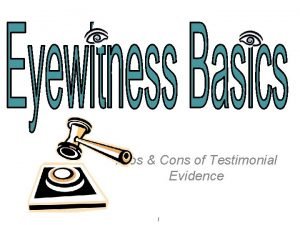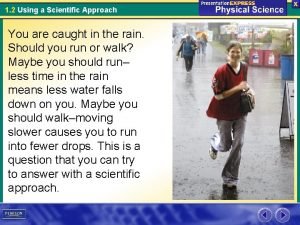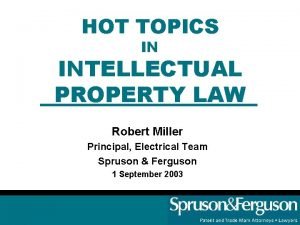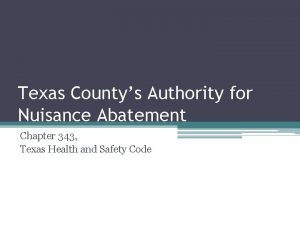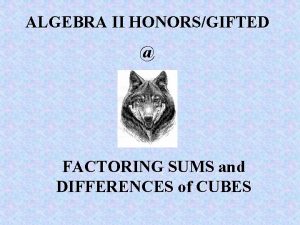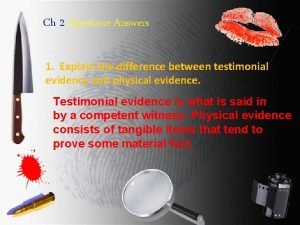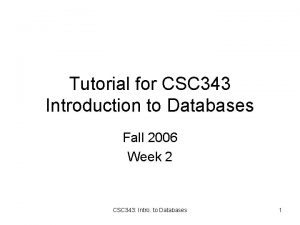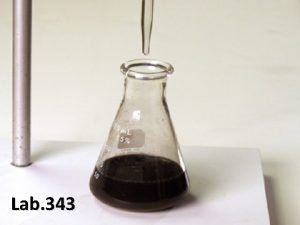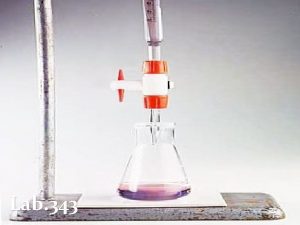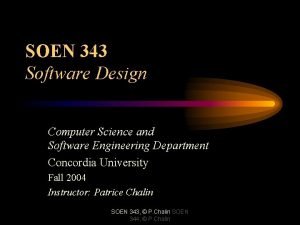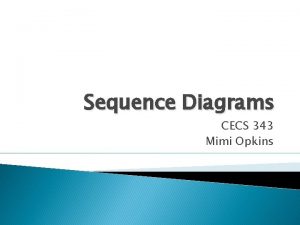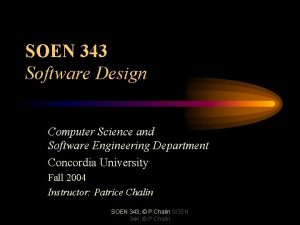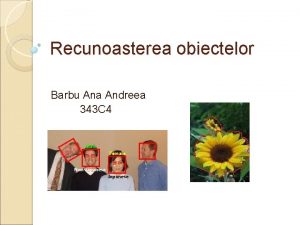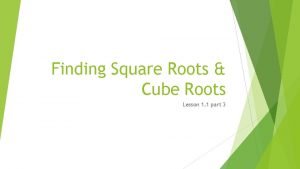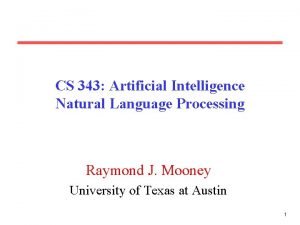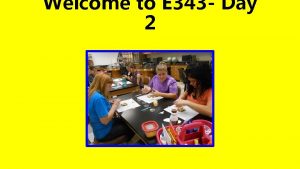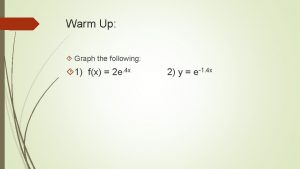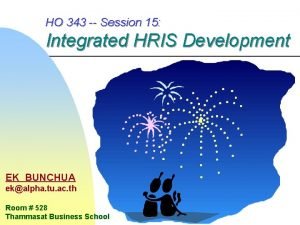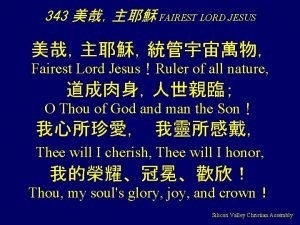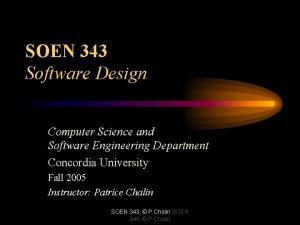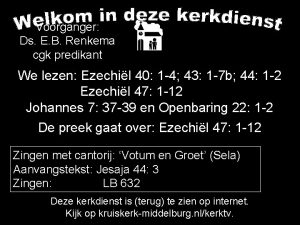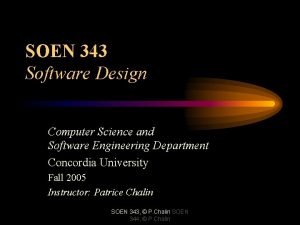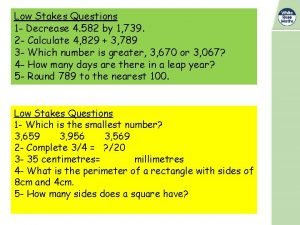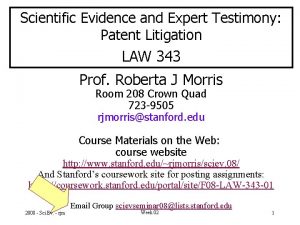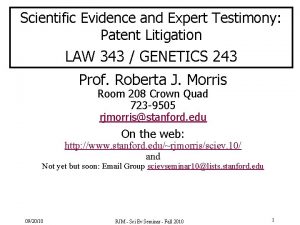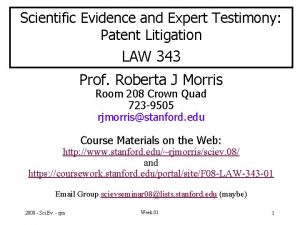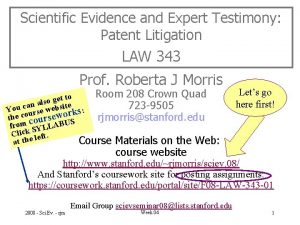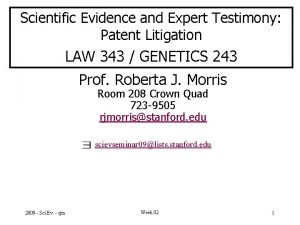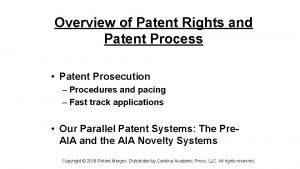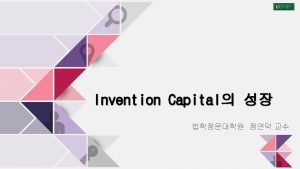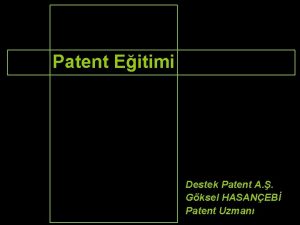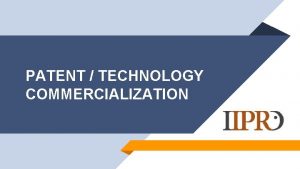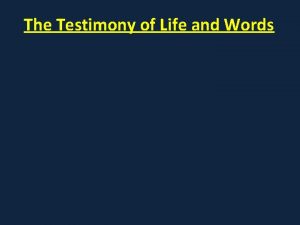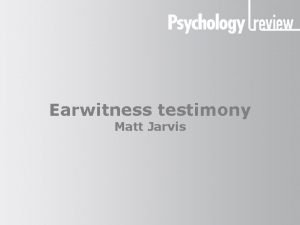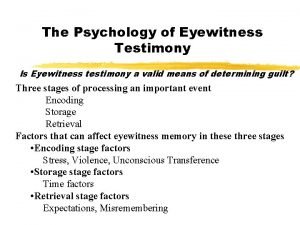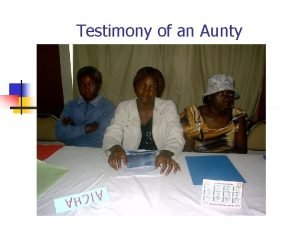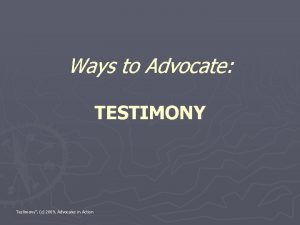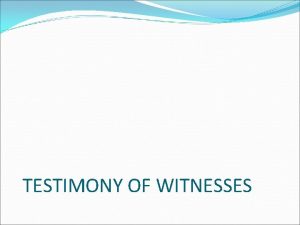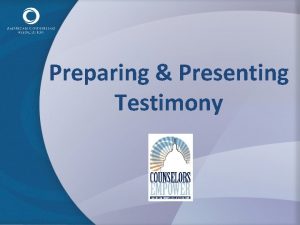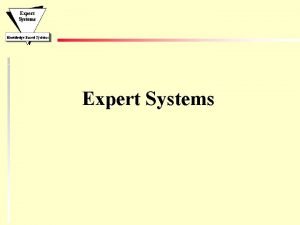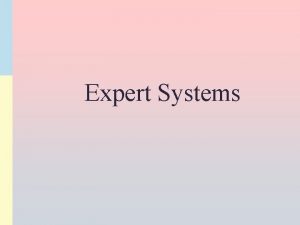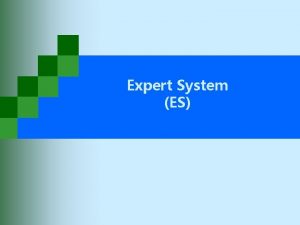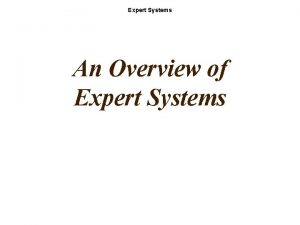LAW 343 Scientific Evidence and Expert Testimony Patent
























- Slides: 24

LAW 343 - Scientific Evidence and Expert Testimony: Patent Litigation Today’s Agenda § What We Will Do in this Seminar (again); What You Have Done So Far § Review of Patent Law – why I wanted to know how much you (collectively) know § The object/patent assignment § KSR – and why it matters for the seminar Sci. Ev. 2007 -rjm 5 min. break at 5: 10. Over at 6: 15. Week 2 - 9/12/07 1

What You Will Do in this Seminar - I assumed you had read the course description long ago, and hadn’t forgotten too much yet. (next slide) - You’ll either perform on the contract or walk. * - Your responses to this week’s assignment were very good. Thank you. - Any questions about the rest of the term? Sci. Ev. 2007 -rjm Week 2 - 9/12/07 2

Or, even bigger For the first part of the term, the class will review relevant patent law and expert (next slide) testimony law. After that, the law and graduate students will work together to select patents for their final simulation projects. Working collaboratively, the students will prepare claim charts and devise a design-around, creating a situation that gives each side adequate room for argument. All students will then be assigned a client, either patent owner or accused infringers. As adversaries, they will present short oral arguments (law students) and summaries of expert declarations (grad students) for a Markman claim construction hearing. In the final weeks of the term, the students will play the roles of litigators and witnesses in simulations of expert testimony. The judges will be practicing patent litigators and patent professors. Sci. Ev. 2007 -rjm Week 2 - 9/12/07 3

For the first part of the term, the class will review relevant patent law and expert testimony law. After that, the law and graduate students will work together to select patents for their final simulation projects. Working collaboratively, the students will prepare claim charts and devise a design-around, creating a situation that gives each side adequate room for argument. All students will then be assigned a client, either patent owner or accused infringers. As adversaries, they will present short oral arguments (law students) and summaries of expert declarations (grad students) for a Markman claim construction hearing. In the final weeks of the term, the students will play the roles of litigators and witnesses in simulations of expert testimony. The judges will be practicing patent litigators and patent professors. Sci. Ev. 2007 -rjm Week 2 - 9/12/07 4

Your Plans and Biases: PO/AI; also Pros/Lit/Corp Last Week’s Slide 5 Which (one or more? !) are you planning to be? Sci. Ev. 2007 -rjm Week 2 - 9/12/07 5

How does this affect you, the litigator, as you work with a scientific expert? WHO HAS THE BOP? WHAT IS THE QOP? Validity AI C&C Infringement PO Preponderance Sci. Ev. 2007 -rjm Week 2 - 9/12/07 6

FAMOUS CASES – Year - Issue All SUPREME except * Aro Top 1964 – repair v reconstruction City of Elizabeth 1878 – experimental use Chakrabarty 1980 – patentable subject matter DSU v. JMS * 2006 – inducing infringement e. Bay 2006 – permanent injunctions Egbert 1881 - experimental use Sci. Ev. 2007 -rjm Week 2 - 9/12/07 7

FAMOUS CASES – Year - Issue Festo All SUPREME except 2002 – pros. history estoppel Graver Tank [Graver Mfg v Linde] 1950 – doctrine of equivalents Graham v. Deere 1966 – obviousness Gurley * 1994 – teaching away Harvard Mouse [Canada] 2002 - patentable subject matter Knorr-Bremse* 2004 - willfulness KSR 2007 – obviousness Sci. Ev. 2007 -rjm Week 2 - 9/12/07 8 *

FAMOUS CASES – Year - Issue All SUPREME except * Markman 1994 – claim construction Monsanto (Canadian) * 2004 – plants Parker v Flook 1978 – patentable subject matter Seagate 1994 – teaching away State Street * 1998 – patentable subject matter Westinghouse v Boyden Brake 1898 – reverse DOE Sci. Ev. 2007 -rjm Week 2 - 9/12/07 9

Your Patented Objects Color/Font Craven: Pill Container Key Freed: Garbage Bag High tech Faulkner: Magnetic Snap Fastener Low tech Tech not [Gamble - Applied Physics: Kleenex Box] what you Marshall: TI Calculator expected category not [Morris: Coffee Sleeve (handout from last week)] (last incomplete due to CW outages) Pan: Toothpaste Squeezer Peng: Auto-turn-off Vacuum Cleaner (three patents) Petrova: TI Calculator Reeslund: Disposable Thermometer Reyes: Water Filter (two patents) van Niekerk: Bicycle Bearing Wahlstrand: Tooth Whitening Strip (two patents) Sci. Ev. 2007 -rjm Week 2 - 9/12/07 10

Reading a Patent How many patents have each of you looked at (howver defined) before last week? • None? • Single digits? • Tens of Patents? • More? Sci. Ev. 2007 -rjm Week 2 - 9/12/07 11

Reading a Patent What you looked at first (first through fifth), what you looked at later, what you ignored. (HANDOUT) What about that cover sheet? Your comments on other people’s cover sheets. What I look at… Sci. Ev. 2007 -rjm Week 2 - 9/12/07 12

Reading a Patent Why choose a patent whose number appears on something you can buy? Your experts may balk at this requirement. Be ready to be firm. How do you read a patent? Always ask: who wants to know? Different perspectives: - PO, PAppl, AI, VC, Curiousity (you, now) - Commonalities and differences in approach Sci. Ev. 2007 -rjm Week 2 - 9/12/07 13

Reading a Patent • PAppl – (looking at prior art patent) – to disclose and maybe to claim around – to see if you should buy/license it • Potential Licensee /AI - litigation – to design around – or buy – or merge… – to challenge validity or enforceability [assuming you’re within the claims] – to negotiate a license intelligently • M&A (PO or Licensee or AI-lit/settlment) – to evaluate an asset • PO - litigation – to evaluate whether you can sue within the bounds of Rule 11 Sci. Ev. 2007 -rjm Week 2 - 9/12/07 14

Who has to look at CLAIMS? Who can IGNORE claims? • • PAppl (looking at prior art patent) Potential Licensee /AI - litigation M&A (either side) PO – litigation (to sue on the patent) Sci. Ev. 2007 -rjm Week 2 - 9/12/07 15

P-I-S v P. A. Situation A Patent-in-suit = NEW Prior Art Patent = OLD Situation B Patent-in-suit = OLD Patent on accused device = NEW Is the New patent valid Is the Old patent infringed by over the Old patent? someone practicing the New patent? New Patent Look at New's CLAIMS Look at New's SPECIFICATION Old Patent Look at Old's SPECIFICATION (what it "teaches") Look at Old's CLAIMS Sci. Ev. 2007 -rjm Week 2 - 9/12/07 16

Lawsuit ≈ Liability & Damages Liability ≈ Validity & Infringement In ANY IP case (copyright, trademark, trade secret), the liability questions are: IS IT VALID? IS IT INFRINGED? What the “it” is will vary, of course. What makes an“it” valid is different, too. So: What is the “it” in a patent case? Sci. Ev. 2007 -rjm Week 2 - 9/12/07 17

Liability ≈ Validity & Infringement Given what the IT is in a patent case, what affects BOTH validity and infringement? How is that resolved in many patent trials? Sci. Ev. 2007 -rjm Week 2 - 9/12/07 18

Your Good Instincts, Your Naivete, Your Insights, Your Ignorance, and All of the Above Craven: “Land” ? Marshall? : M+F Faulkner: boiler plate introducing claims & Faulkner: “substantially” Reyes: role of inventor’s other, NOT cited, patent. Why might it NOT matter? 6103114 v 5882507 statute(s) MPEP Peng & ____: references cited are the PTO/Examiner’s finds Sci. Ev. 2007 -rjm Week 2 - 9/12/07 19

Claim Language – M+F How many of you already know about M+F claims? Means + Function claims are common. They are permitted under Sec. 112 P 6 (quoted on next slide). Looking at the statute, or from prior experience, where will the controversies lie in a M+F claim? Sci. Ev. 2007 -rjm Week 2 - 9/12/07 20

35 USC 112 ¶ 6 An element such claim in a claim shall be construed for a combination to cover may be expressed as the corresponding a means or step structure, for performing material, or a specified acts function described without the recital of in the specification structure, and material, or equivalents thereof. acts in support thereof, and **for LITERAL infringement, not DOE infringement** Sci. Ev. 2007 -rjm Week 2 - 9/12/07 21

KSR Your Verbs - POS NEG or BOTH SC - thrills JAF - frustrates JDF - engenders ambivalence SM - slightly bothers RM – irritates, when it doesn’t make me chortle (arrogantly) LP - amuses JP - intrigues HP - charms JR - shocks MR - concerns Rv. N - surprises JW - appeals to Sci. Ev. 2007 -rjm Week 2 - 9/12/07 22

KSR and the factoid Two-edged sword – the strategic problem of such evidence Simultaneous independent invention: proof of obviousness? or grounds to declare an interference? Sci. Ev. 2007 -rjm Week 2 - 9/12/07 23

Next Week Meet the graduate students Reading assignment for them and you – TBD. Sci. Ev. 2007 -rjm Week 2 - 9/12/07 24
 Testimonial evidence example
Testimonial evidence example How is a scientific law different from a scientific theory?
How is a scientific law different from a scientific theory? Newton's first law and second law and third law
Newton's first law and second law and third law Si unit of newton's first law
Si unit of newton's first law Hot topics in patent law
Hot topics in patent law Texas health and safety code 343
Texas health and safety code 343 125x^3-64
125x^3-64 Individual evidence can have probative value.
Individual evidence can have probative value. Csc343
Csc343 Log k = log a - ea/rt
Log k = log a - ea/rt Experiment 343
Experiment 343 Soen 343
Soen 343 Cecs 343
Cecs 343 Soen 343
Soen 343 343 descompunere
343 descompunere X3 = 64/343
X3 = 64/343 Cs 343
Cs 343 343 day
343 day Log 343
Log 343 343 pro session
343 pro session Jesus 343
Jesus 343 Soen 343
Soen 343 Ds renkema
Ds renkema Soen 343
Soen 343 582 x 4
582 x 4
